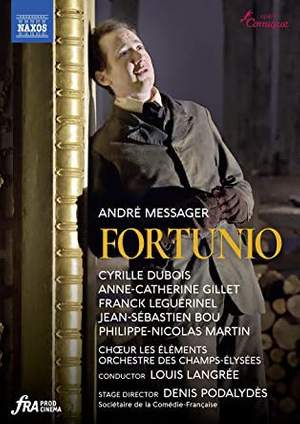MESSAGER Fortunio (Langrée)
View record and artist detailsRecord and Artist Details
Genre:
Opera
Label: Naxos
Magazine Review Date: 12/2020
Media Format: Digital Versatile Disc
Media Runtime: 119
Mastering:
DDD
Catalogue Number: 2 110672

Tracks:
| Composition | Artist Credit |
|---|---|
| Fortunio |
André (Charles Prosper) Messager, Composer
Anne-Catherine Gillet, Jacqueline, Soprano Champs-Élysées Orchestra, Paris Cyrille Dubois, Fortunio, Tenor Franck Leguerinel, Maitre Andre, Baritone Jean-Sébastien Bou, Clavaroche, Baritone Louis Langrée, Conductor |
Author: Mark Pullinger
André Messager’s a bit of a rarity in the opera house these days. The work you’re most likely to encounter in the UK is his music for the ballet The Two Pigeons (revived, in recent years, by The Royal Ballet), but most of his stage works were operettas or opéras comiques. The aria ‘Le jour sous le soleil béni’ from Madame Chrysanthème crops up on the occasional recital disc but it’s his comédie lyrique Fortunio that has captured Parisian hearts. Denis Podalydès’s 2009 production at the Opéra-Comique made a welcome return last December, which I saw from one of the cramped wooden seats high up in the gods.
The Comique excavates its fair share of French froth – Offenbach is a house speciality – but Fortunio isn’t in that mould. It’s a touching little romcom, based on Alfred de Musset’s play Le chandelier, about a shy young clerk to the lawyer Maître André, who is used as a decoy for an affair between André’s wife, Jacqueline, and the officer Clavaroche … the only problem being that Fortunio falls for Jacqueline himself. The cuckolded lawyer is a comic character, but young Fortunio is a sincere soul whose purity wins Jacqueline’s affections, ousting her soldier lover.
The work premiered at the Comique in 1907, with the likes of Claude Debussy, Reynaldo Hahn and Gabriel Fauré among the audience. Fauré, who as Messager’s former composition teacher may have been a little biased, reviewed it for Le Figaro, praising the composer’s ‘gifts of elegance and clarity, of wit, of playful grace, united to the most perfect knowledge of the technique of his art, the rarest qualities of emotion and delicacy’. Musically, it is indeed full of interest – imagine Massenet’s Werther tinged with Wagner. Fortunio and Jacqueline share a particularly heady duet in Act 4.
Podalydès follows the libretto faithfully, while transferring the action to the period of composition. From the snow-strewn courtyard at the beginning, Éric Ruf’s sets are simple and attractive, as are the elegant costumes by Christian Lacroix.
Cyrille Dubois is wonderful in the title-role. His tenor, with its slight flutter and exquisite head notes, makes for an appealing performance as the lovelorn youngster. He is well matched by Anne-Catherine Gillet’s attractive Jacqueline, smoothly sung, well acted. Franck Leguérinel has fun as her crusty old husband, while Jean-Sébastien Bou offers plenty of swagger as her secret lover, his high baritone in fine fettle (I enjoyed him in Mârouf, savetier du Caire at the Comique a year earlier). In the pit, Louis Langrée coaxes lovely, affectionate playing from the Orchestre des Champs-Élysées, shaping Messager’s melodies with great care.
For gentle, escapist charm – and many of us require large doses of that right now – Fortunio would seem to be the perfect remedy.
Discover the world's largest classical music catalogue with Presto Music.

Gramophone Digital Club
- Digital Edition
- Digital Archive
- Reviews Database
- Full website access
From £8.75 / month
Subscribe
Gramophone Full Club
- Print Edition
- Digital Edition
- Digital Archive
- Reviews Database
- Full website access
From £11.00 / month
Subscribe
If you are a library, university or other organisation that would be interested in an institutional subscription to Gramophone please click here for further information.




